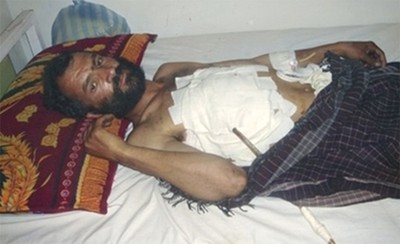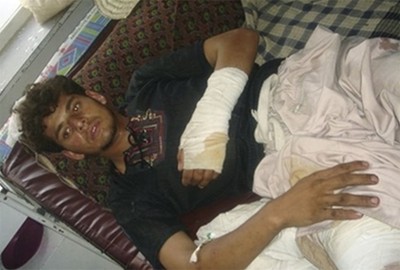In memory of and sympathy for 17 civilians killed:
Dr. Nemetalluh, doctor of Bella village’s clinic
Kalam Massi, guard at clinic
Naeem Massi, clinic nurse employee
Sonkra, landowner near Bella
Rafiullah, son of Sonkra
Sonkra’s wife
Noorullah, son of Rafiullah
Sonkra’s grandchild, 8 mos old
Sulaiman Klorik, a shopkeeper
Hazrat Ali, a driver
Shoaib Sondi, a shopkeeper
Kafayatullah, a driver
Tabgul, a driver
Dr. Najeebullah, a doctor at Bella’s clinic
Sanaullah, a shopkeeper
(Two other civilians)
The following were wounded:
Wiaullah Muraluddin, a landowner near Bella
Dr. Zainab, female employee at Bella’s clinic
Asma, 8, daughter of Dr. Nematullah
Abdullah, son of Mira Jan, a shopkeeper in Bella
Rohullah, a worker in Waigal
Ansarullah, a shopkeeper
They were killed or wounded on Friday, July 4, 2008, on a road near Aranas village on the Waygal River in the district of Waigal (Waygal), Nuristan Province. The Province’s Governor himself, Tamim Nuristani, told various media including the AFP that 16 civilians were killed in an air strike as they were leaving an area after being told by security forces a military operation was about to occur. District governor Zia-ul-Rehman said that 22 civilians had died in the strike.
As usual, the US/NATO militaries proclaimed that the dead were “militants.” An issued statement announced that “militants had fired on the U.S. base in Bella”, then “the insurgents…entered two vehicles and began traveling away from the firing position. Ground forces called coalition (sic) attack helicopters for support….which then destroyed the two vehicles killing more than a dozen militants.” U.S. First Lt. Nathan Perry said, “These were combatants. These were people firing on us. We have no reports of noncombatant injuries.”
The following photos show some of the “militants” injured by U.S Apache attack helicopters:


The day after, officials in Nuristan said three doctors were amongst the dead – a female nurse and two males. This was confirmed in Kabul by the Public Health Ministry. Four other government officials were killed. Two children were also killed by the Apache attack helicopters. An injured man succumbed to his injuries late Saturday night. Nuristan officials added that US troops had blocked most of the roads leading to villages where funeral prayers were being held for the slaughtered villagers.
On July 10th, the U.S. puppet Karzai sacked the governor of Nuristan for speaking out about civilian casualties (no doubt as part of US/NATO news management).
Summary of Civilian Impact Deaths Resulting from U.S./NATO Military Actions in Afghanistan:
| Time period | Low estimate | High estimate |
| Oct 7, 2001 – May 31, 2003 | 3,082 | 3,606 |
| (Oct 7, 2001 – Dec 10, 2001) | (2,569) | (2,949) |
| June 1, 2003 – July 31, 2004 | 412 | 437 |
| Aug 1, 2004 – December 31, 2006 | 727 | 855 |
| (during 2006) | (303) | (360) |
| Sub-total………….. | 4,221 | 4,898 |
| Injured from US bombing who later died* | 640 | 796 |
| Jan.1 – Dec 31, 2007 Jan 1 – July 1, 2008 GRAND TOTAL... | 1,008 260 6,129 | 1,295 332 7,321 |
*estimates only for period Oct 7, 2001 – Dec 10, 2001 based upon ratio of 1.8 civilians injured for each civilian killed during U.S. bombing attack and a mortality rate of 15% of the injured (figure is based upon Afghan hospital data).
Sources: the data above is compiled from three separate data files covering the period of October 7, 2001 – May 28, 2008. The raw data files may be accessed at http://pubpages.unh.edu/~mwherold/. The period from September 2004 – present is covered in The Afghan Victim Memorial Project which can be viewed at http://pubpages.unh.edu/~mwherold/memorial.htm




